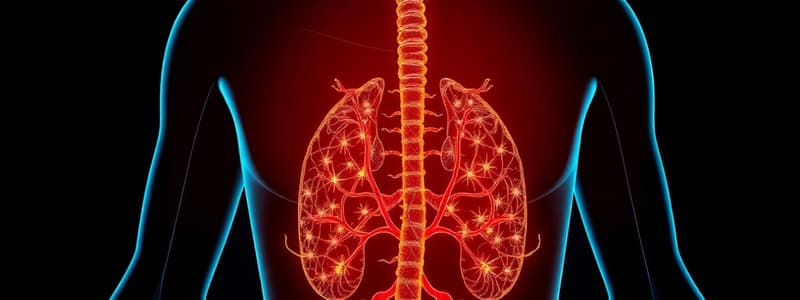Podcast
Questions and Answers
Which of the following glands is considered the master gland?
Which of the following glands is considered the master gland?
- Pituitary (correct)
- Adrenal
- Thyroid
- Pineal
What is the function of hormones in the endocrine system?
What is the function of hormones in the endocrine system?
- To create blood cells
- To transport oxygen
- To break down food
- To act as chemical messengers (correct)
What is diabetes insipidus caused by?
What is diabetes insipidus caused by?
Hyposecretion of Antidiuretic Hormone (ADH)
What does the hypothalamus regulate between the endocrine and nervous systems?
What does the hypothalamus regulate between the endocrine and nervous systems?
Which hormone is essential for the growth of the adrenal cortex?
Which hormone is essential for the growth of the adrenal cortex?
The hormone responsible for stimulating uterine contractions during labor is called ______.
The hormone responsible for stimulating uterine contractions during labor is called ______.
What is the role of Melatonin?
What is the role of Melatonin?
Thyroxine (T4) and Triiodothyronine (T3) are essential for maintaining blood calcium levels.
Thyroxine (T4) and Triiodothyronine (T3) are essential for maintaining blood calcium levels.
What condition is caused by the hyposecretion of T3 and T4?
What condition is caused by the hyposecretion of T3 and T4?
Which hormone stimulates the development of ovarian follicles in females?
Which hormone stimulates the development of ovarian follicles in females?
Flashcards are hidden until you start studying
Study Notes
Endocrine System Overview
- Composed of glands that secrete hormones, with primary producers being the endocrine glands.
- Other hormone-producing organs include the brain, heart, lungs, liver, skin, thymus, gastrointestinal mucosa, and placenta.
Primary Endocrine Glands
- Pituitary Gland: Known as the master gland, regulates other glands.
- Other glands include the pineal, thyroid, parathyroid, islets of Langerhans, adrenals, ovaries (female), and testes (male).
Hormones and Their Functions
- Hormones are chemical transmitters released in small amounts, transported via bloodstream to target organs.
- Regulate various body functions: growth, metabolism, mood, and sexual function.
Hormone Regulation
- Hyposecretion and hypersecretion of hormones can lead to disorders.
- Controlling hormone production is crucial for treating hormonal disorders.
Interaction with the Nervous System
- The endocrine and nervous systems collaborate to maintain homeostasis.
- Hypothalamus: Primary link between the two systems, stimulates or suppresses pituitary hormone secretions.
Key Hormones Produced by the Pituitary Gland
- Growth Hormone (GH): Crucial for growth and development, enhances protein synthesis, and promotes fat destruction.
- Adrenocorticotropin (ACTH): Stimulates adrenal cortex growth.
- Thyroid-Stimulating Hormone (TSH): Important for thyroid gland growth and function.
- Follicle-Stimulating Hormone (FSH): Stimulates ovarian follicle growth and sperm production.
- Luteinizing Hormone (LH): Stimulates corpus luteum development and testosterone production.
- Prolactin (PRL): Promotes mammary gland growth and milk production during pregnancy.
- Melanocyte-Stimulating Hormone (MSH): Regulates skin pigmentation and melanin deposition.
Additional Hormones
- Antidiuretic Hormone (ADH): Stimulates water reabsorption in kidneys; hyposecretion can lead to diabetes insipidus.
- Oxytocin: Triggers uterine contractions during labor and milk ejection; synthetic form used to induce labor.
Pineal Gland
- Small, pine-cone-shaped gland producing melatonin which regulates sleep/wake cycles and environmental lighting effects.
- Serotonin: Acts as a neurotransmitter impacting appetite, mood, and metabolism.
Thyroid Gland Functions
- Essential for metabolism regulation; influences basal metabolic rate (BMR).
- Produces calcitonin for calcium metabolism and homeostasis.
- Thyroxine (T4) and triodothyronine (T3): Key for BMR, physical, and mental development.
- Hyposecretion of T3 and T4: Leads to disorders like complete cretinism and Hashimoto’s disease.
- Hypersecretion of T3 and T4: Associated with conditions like Grave's disease.
Studying That Suits You
Use AI to generate personalized quizzes and flashcards to suit your learning preferences.




